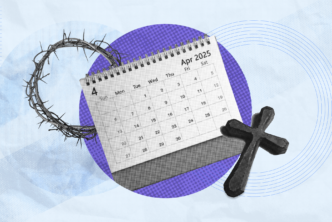Christians follow a God who throughout Scripture claims to understand the experience of giving birth—both to believers and to a whole new creation. So shouldn’t Christians have a robust view of how the birth process shapes women and shows us the heart of our Creator? In this excerpt from Holy Labor: How Childbirth Shapes a Woman’s Soul, Aubry G. Smith draws on her own experiences to show us—expectant mothers, mothers, and those who know them—how birth can illuminate the gospel.
If someone had asked me how I felt about childbirth before my first pregnancy, I would have said, “It’s the most painful experience in the world!” The only way I knew to view birth was through the lens of fear and pain. Veteran moms shared their war stories of excruciating contractions, hours of pushing, and emergency cesareans. Most women I knew chose an epidural, certain they could not handle the physical pain of labor. My own mother, who gave birth to five children, patted my hand and said, “Ask for Demerol. It’s fabulous.” Everything I heard about childbirth was based in fear and the expectation of unbearable pain. These war stories confirmed my beliefs about childbirth: It’s the worst experience in the world, and a mother’s job is merely to survive it.
While not against pain relief (I’m no martyr!), I felt uneasy about this common understanding—that women could not bear what God designed their bodies to do. I fumbled as I tried to merge theological and biological information. It seemed a given that God had cursed Eve and her daughters with pain in childbirth for her sin—isn’t that what Genesis 3:16 says? Who can escape God’s judgment? I felt as if I should forego any pain relief during labor to avoid somehow thwarting God’s judgment-related purposes for childbirth.
Toward a biblical view of childbirth
In general, the church has little to say to women preparing for childbirth. While women can bring their medical concerns to trained caregivers, where should expectant mothers take their fears, their desire to honor God in birth, and their questions about how to view a God who created childbirth this way? While resources on biblical parenting abound, there are virtually no resources for Christian women who want to explore the significance of childbirth through a biblical lens.
Does the Bible have nothing to say about facing fear, suffering for the sake of bringing someone life, finding purpose in pain, experiencing peace, or childbirth in general? How should Christians view birth?
Childbirth is theological—we understand God better when we understand childbirth better. The Bible is replete with rich birth-related descriptions of our God—who created birth, who cocreates with humans in conception and childbirth, who gave birth to and nursed Israel, who opens and closes wombs, and who himself participated in childbirth as a baby. Our theology concerning childbirth should cause us to ask questions about what we believe about God. Do we believe he is cursing women with pain again and again as a continued judgment for Eve’s sin? Is he pleased with birth? Angry? A helper in childbirth?
When we put childbirth in a biblical perspective, within the context of the gospel, it becomes clearer for us. We encounter God as we ask him for wisdom for our childbirth choices, for grace in labor, and patience in the last long weeks of pregnancy. We come to him and repent, confessing our pride or lack of trust. Regardless of birth choices or outcomes we find grace and not shame in Christ, who nailed our shame to the cross (Col 2:14). When we press into Jesus, our wounds are bound up and our traumas are healed. As we approach labor we lay aside guilt, fear, and insecurities about our choices and what others might think. We rest in Christ, knowing that he loves us and is pleased with us. In childbirth, one of the most common experiences among women, we find the gospel proclaimed and grace lavished on us by God.
* * *





